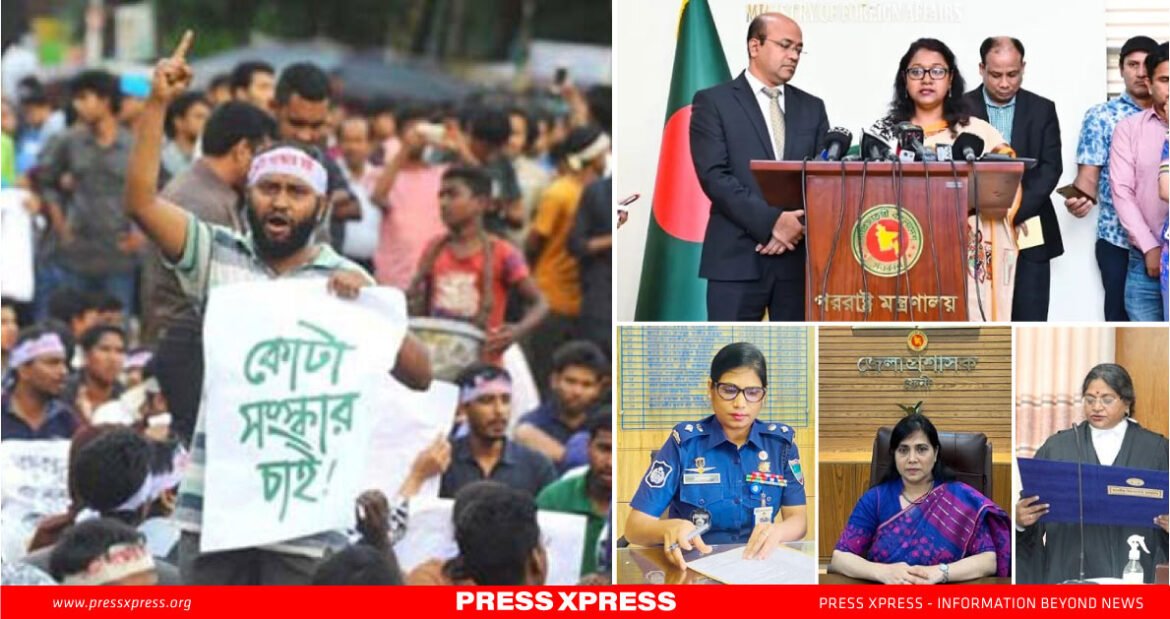Key Highlights:
- The quota had been in place until the 39th Special BCS but has not been enforced since the 40th BCS
- Analysis of the results from the last 5 BCS exams revealed these trends, showing that women trail by 3.43% compared to quota-based appointments in the BCS
- In the 36th BCS batch, 584 females were recommended out of a total of 2323 officers, constituting 25.89% of the recommended candidates
Since independence, Bangladesh has maintained job reservations in the public sector for disadvantaged groups. The government abolished the quota system for grades 9 to 13 in the national salary structure, previously applicable from the 1st to 2nd classes, effective October 4, 2018, amidst protests from students and job seekers.
The quota had been in place until the 39th Special BCS but has not been enforced since the 40th BCS.
Previously, under the Public Service Commission (PSC), there was a 10% quota for women in recruitment for the first and second classes. However, following the removal of the female quota system, women now face disparities in application and success rates in exams, with men outnumbering women in applications.
This gender gap also impacts their pass rates. Analysis of the results from the last 5 BCS exams revealed these trends, showing that women trail by 3.43% compared to quota-based appointments in the BCS. Abolishing the quota system could further diminish women’s representation in the workforce.
Therefore, ensuring job opportunities for women through quotas remains critically necessary.
The Alarming Drop in Female BCS Candidates Over Different Batches

Since the abolition of quotas, the number of female candidates recommended in Bangladesh Civil Service examinations has shown a significant decline. In the 41st BCS exam, conducted under the circular dated 27th November 2019 and with results announced on 3rd August 2023, a total of 2,516 candidates were recommended, comprising 1,844 males (73.29%) and 672 females (26.71%).
The trend continued in the 42nd BCS (Special, Doctors), where out of 4,000 recommended candidates following the circular on 30th November 2020 and results on 9th September 2021, 2,039 were males (50.90%) and 1,961 were females (49%), specifically among doctors.
In the latest 43rd BCS exam, announced on 26th December 2023 under the same circular, 2,163 candidates were recommended, with 1,742 males (80.53%) and 421 females (19.47%). These figures highlight a concerning decline in female representation since the removal of quotas.
Female Representation in Government Exams: Before and After Quota Abolition

There has been a noticeable decline in the number of female candidates recommended for officer positions in Bangladesh Civil Service examinations. Before this change, the representation of female candidates showed more promising figures.
For instance, in the 36th BCS batch, 584 females were recommended out of a total of 2323 officers, constituting 25.89% of the recommended candidates. Batch 38 similarly saw 578 females recommended out of 2204 officers, accounting for 26.87%. These numbers reflected a significant effort towards gender inclusivity in civil service recruitment.
However, with the quota system abolished after Batch 40, the figures began to shift and Batch 40 marked a transitional phase with 121 females recommended out of 574 officers, comprising 21.08%.
In Batch 41, 173 females were recommended out of 816 officers, amounting to 21.20%. This slight decrease continued in subsequent batches, with Batch 43 recording 110 females recommended out of 645 officers, making up as low as 17.05% of the total recommended.
The trend highlights a clear impact of quota policies on female representation in civil service recommendations. Before the abolition, quotas likely facilitated a more balanced gender representation, as seen in higher percentages of recommended female candidates. Post-abolition, the decline suggests challenges or barriers that may hinder female participation or success in the civil service examinations.
Analyzing these figures provides insight into the evolving dynamics of gender representation in Bangladesh’s civil service, reflecting broader societal and policy shifts impacting career opportunities for women in government service.

Female Officers in Post-Quota BCS Police
Following the abolition of quotas, the recruitment of women into the BCS police began to decrease.
Furthermore, female officers were not recruited from 24 districts in Batch 40 and 18 districts in Batch 41.
It’s clear from the data that since the abolition of quotas, there has been a worrying decline in female representation in Bangladesh Civil Service exams. The numbers speak for themselves. This decline underscores the importance of reinstating quotas to ensure equitable opportunities for women in public service.
Without such measures, achieving gender balance and fostering inclusive governance will remain elusive goals. Restoring the female quota is not just about fairness; it’s about harnessing the full potential of Bangladesh’s talent pool to build a stronger and more representative civil service for the future.


